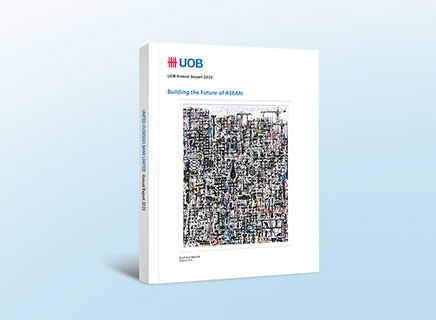
Governance
Our robust governance framework defines our commitment and guides our approach to conducting business.
Governance structure
Our governance structure ensures leadership oversight as well as the effective development and management of sustainability strategies and initiatives.
Group Sustainability Framework
The Group Sustainability Framework was formalised in 2019. Underpinned by policies and guidelines that define our commitment and guide our approach to conducting business, the framework supports UOB’s business decision-making at all levels. It provides guidance on the management of sustainability-related risks and business opportunities in the context of our direct and indirect impact to the environment, society and the economy.
It is the responsibility of all UOB employees to comply with the UOB Group Sustainability Framework. The management teams of the UOB entities are responsible for appraising the relevant sustainability issues in their respective domains and for taking appropriate steps to ensure that customers and suppliers also meet relevant policy requirements, wherever applicable.
Corporate governance and risk culture
UOB’s strong corporate governance and risk culture are built on our values of Honourable, Enterprising, United and Committed, and are core to the Group’s broader organisational culture. Our corporate governance is based on a partnership between our Board and Management, supported by a system of comprehensive risk frameworks, policies, methodologies, tools and processes by which we operate, measure and manage material risks and opportunities. We review our governance approach and risk frameworks regularly, and revise them if necessary, to ensure that they are up to date, relevant and aligned with best practices.


To promote awareness of and instil risk culture across the Group, we:
- require all employees to complete, on an annual basis, a mandatory UOB Risk Culture e-learning module, as well as training aimed at reinforcing risk-focused conduct in areas such as the UOB Code of Conduct, anti-money laundering, operational and security risks, financial crime prevention, information security and cyber risk awareness, and the UK Bribery Act;
- require key business and support units to conduct a self assessment annually to evaluate the risk culture within each of their units;
- frequently feature senior leaders and their views on risk culture, as well as case studies and lessons learnt on our intranet;
- ensure consistent Bank wide communications through in person meetings, town hall meetings, discussion groups and internal bulletins to foster deeper understanding and practice of risk management across the organisation;
- include risk management related questions in our employee engagement survey to gauge the understanding of the prevailing risk culture across the Group; and
- survey senior management committees to assess their openness and robustness to challenges, and their considerations of risks in their decision making process.
Whistle-blowing
Employees, business associates and the public are able to report any concerns of suspected or actual wrongdoing confidentially and securely, without fear of reprisal, through our whistle-blowing channels. They may call our whistle-blowing hotline, email or call the Head of Group Audit, Chief Executive Officer, Chairman of the Board Audit Committee or Chairman of the Board. The UOB Whistle-blowing Policy is reviewed annually and approved by the Board Audit Committee.
Reports may be sent by post to the Head of Group Audit at United Overseas Bank Limited, One Raffles Place, Tower 1 #15-02, Singapore 048616 or by email to whistleblowing@uobgroup.com. All reports received are accorded confidentiality and investigated independently by Group Audit, the administrator of the whistleblowing policy. Group Audit submits regular updates on whistleblowing reports received to the Audit Committee.
Prohibiting insider trading
All employees are required to adhere to the UOB Group Staff Trading Policy, which prohibits insider trading. The policy is reviewed annually and approved by the Operational Risk Management Committee (ORMC).
UOB has in place a pre-trade clearance system that requires employees, who may reasonably be expected to have access to inside information, to make declarations and seek approval before dealing in securities or executing their trades on any stock exchanges. In addition, Group Compliance regularly reviews securities transactions to detect potential violations. Employees may be subject to disciplinary action for non-adherence to the policy.
Related

Strategy
Our sustainability strategy is embedded in our business and aligns with the UN SDGs.

Materiality
We identify material ESG factors which matter most to our business.

Stakeholder engagement
We engage our stakeholders through dialogue and collaboration.





